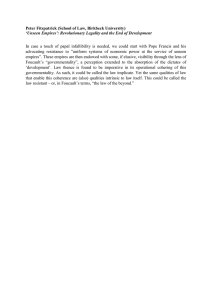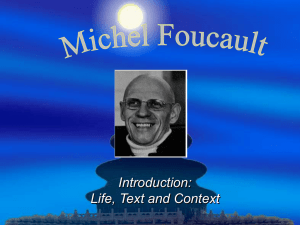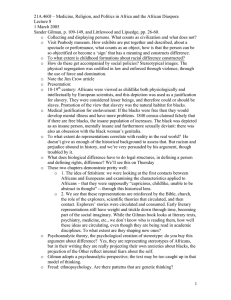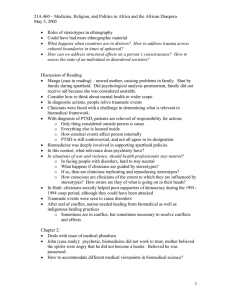21A.460 – Race, Religion, and Medicine in the African Diaspora
advertisement
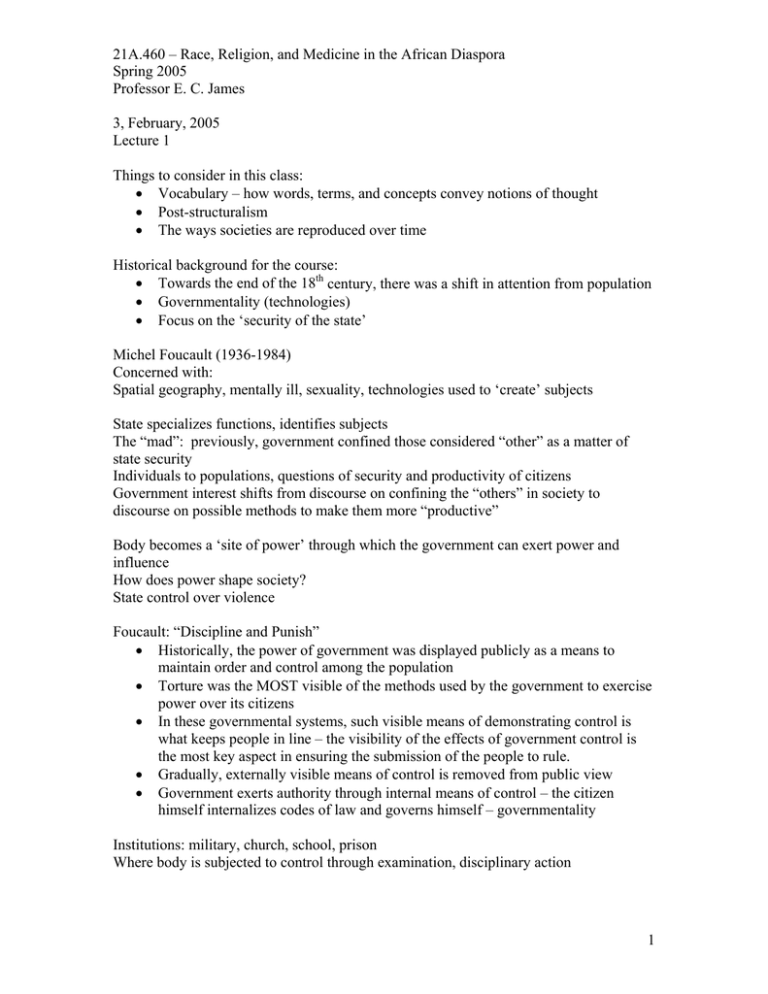
21A.460 – Race, Religion, and Medicine in the African Diaspora Spring 2005 Professor E. C. James 3, February, 2005 Lecture 1 Things to consider in this class: • Vocabulary – how words, terms, and concepts convey notions of thought • Post-structuralism • The ways societies are reproduced over time Historical background for the course: • Towards the end of the 18th century, there was a shift in attention from population • Governmentality (technologies) • Focus on the ‘security of the state’ Michel Foucault (1936-1984) Concerned with: Spatial geography, mentally ill, sexuality, technologies used to ‘create’ subjects State specializes functions, identifies subjects The “mad”: previously, government confined those considered “other” as a matter of state security Individuals to populations, questions of security and productivity of citizens Government interest shifts from discourse on confining the “others” in society to discourse on possible methods to make them more “productive” Body becomes a ‘site of power’ through which the government can exert power and influence How does power shape society? State control over violence Foucault: “Discipline and Punish” • Historically, the power of government was displayed publicly as a means to maintain order and control among the population • Torture was the MOST visible of the methods used by the government to exercise power over its citizens • In these governmental systems, such visible means of demonstrating control is what keeps people in line – the visibility of the effects of government control is the most key aspect in ensuring the submission of the people to rule. • Gradually, externally visible means of control is removed from public view • Government exerts authority through internal means of control – the citizen himself internalizes codes of law and governs himself – governmentality Institutions: military, church, school, prison Where body is subjected to control through examination, disciplinary action 1 21A.460 – Race, Religion, and Medicine in the African Diaspora Spring 2005 Professor E. C. James Codes of behavior are normalized – people cannot see it and hence the fact that the person is being controlled is made invisible. Power exerted through internal policing Butchart – The Anatomy of Power Foucault: idea of the Panopticon, the ‘all-seeing eye’ prisoners cannot see the source of power, but always know that it is there How power is deployed throughout society Citizens themselves are used to police themselves and others without direct intervention by authority figures These efforts to make policies internal, using citizens to police themselves and others “create” notions of ‘citizenship’ and the idea of an alien ‘other’ Minute discipline actions and normalized codes of behavior create the conception of the individual and makes them subjects to the law – makes productivity possible. Foucault: History of Sexuality • Deals with notions of sexuality throughout history • Focuses on analyzing the family as an object of institutional control • Child’s body is a key means to producing identity • Terminology: apparatuses of state – the networks of power and control deployed by the state to reproduce power at all levels of society Race, health, identity all involved in Foucauldian idea of “sexuality” Describes the historical, social processes around ‘sexuality’ particularly in European society Critique: Foucault leaves out colonial aspect in his works. No analysis or mention of ‘minorities’ in the creation of bodies, identity, and institutional control. -- ‘techniques of power’ that Foucault describes in the context of European society could have been used first in colonial context – glaring error/oversight in Foucault’s work What are institutions of power? Noso-politics = biopolitics Technology is a practice of power Liberalism – person is autonomous, free to do anything, an ‘individual’ with rights, and the right to accumulate property, wealth, material possessions. Value of productivity Questions of how goods/labor/individuals interconvert within society 2 21A.460 – Race, Religion, and Medicine in the African Diaspora Spring 2005 Professor E. C. James Haiti—Case study Contemporary government in Haiti – what is the best form of post-colonial government? Jean-Bertrand Aristide – unpopular with US and Western nations • Sought to raise the minimum wage for Haitian workers Questions of security vs. democracy – is democracy necessary for economic growth? What do ‘black nations’ need? Stereotype that black people can’t govern themselves Categorizations of populations State of the union-social security Republicanism – reducing economic regulation, increasing role of security, dominant rhetoric in security, human rights. Haiti – economic versus political refugees normalizing political instabilities as due to ‘cultural’ issues Haitians identified as HIV vector Standards of state security defined to include health of a population. Haitians excluded from entry into the United States due to ‘health’ risks potentially posed to US populations Economic productivity closely tied to issues of discipline, surveillance, invisibility Systematic, justifiable, invisibilizing Focus on body of individual creation of individual 3 MIT OpenCourseWare http://ocw.mit.edu 21A.460J / WGS.620J Medicine, Religion and Politics in Africa and the African Diaspora Spring 2005 For information about citing these materials or our Terms of Use, visit: http://ocw.mit.edu/terms.

